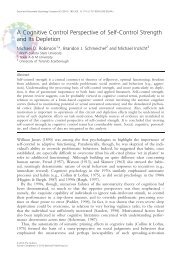Emotions and self-control 1 Incidental and Integral ... - Michael Inzlicht
Emotions and self-control 1 Incidental and Integral ... - Michael Inzlicht
Emotions and self-control 1 Incidental and Integral ... - Michael Inzlicht
You also want an ePaper? Increase the reach of your titles
YUMPU automatically turns print PDFs into web optimized ePapers that Google loves.
<strong>Emotions</strong> <strong>and</strong> <strong>self</strong>-<strong>control</strong> 14<br />
A study by Hirsh, Guindon, Morisano, <strong>and</strong> Peterson (2010) tested his hypothesis.<br />
Participants completed a series of puzzles faster than a confederate, slower than a confederate, or<br />
no confederate was present. Participants then completed a measure of delay discounting, which<br />
assesses preferences for immediate versus delayed rewards. This measure asked participants to<br />
make a series of choices between hypothetical rewards, one a smaller, sooner reward <strong>and</strong> the<br />
other a larger, delayed reward (e.g., $2 now or $20 in a year?; $900 now or $1000 in 6 months?;<br />
$18 now or $20 in a week?). Altogether, a participant’s choices yield an idiosyncratic discount<br />
rate, such that higher discount rates indicate lower delay of gratification (i.e., a preference for<br />
smaller immediate rewards over larger delayed ones).<br />
Changes in positive emotions from before to after the puzzle task predicted subsequent<br />
discount rates, but only among extraverts. Specifically, among more extraverted individuals,<br />
greater increases in positive emotions predicted higher discount rates (i.e., lower delay of<br />
gratification). Changes in negative emotions did not predict discount rates. Hirsh <strong>and</strong> colleagues<br />
(2010) proposed that positive emotions potentiate the tendency for extraverted individuals to<br />
orient toward opportunities for reward, leading to a bias toward immediate gratification.<br />
The findings of Hirsh <strong>and</strong> colleagues (2010) are notable because they run counter to the<br />
findings from studies of children, which had revealed that positive emotions increase delay of<br />
gratification. This research is thus among the first to suggest that positive emotions can reduce<br />
delay of gratification, <strong>and</strong> the findings fit with evidence that sexual arousal makes adult males<br />
more likely to discount the future (Wilson & Daly, 2004; see also Ariely & Loewenstein, 2006).<br />
Additional evidence has accumulated to support the idea that, in adults at least, positive<br />
emotions can reduce delay behavior. One experiment found that both positive <strong>and</strong> negative<br />
emotions reduce delay of gratification, depending on the person. Specifically, Augustine <strong>and</strong>



